The best books to help you learn and improve the Ukrainian language. Simple and accessible self-study guides of the Ukrainian language: with humor, in pictures, with examples from life
The Ukrainian language is becoming more and more popular in society. According to a survey conducted last year, the lion's share (73%) of our citizens want to read, watch TV and communicate in Ukrainian. More and more Internet resources are trying to provide Ukrainian-language content, opinion leaders and popular bloggers are switching to their native language.
However, this is not easy for everyone: according to the same survey, for half (47%) of Ukrainians, Russian language remains familiar from childhood. Many would like to “switch” to Ukrainian in everyday life, but how can this be done easily and organically? Would you like to study school textbooks and take lessons from a tutor? The "correct" books will help to solve the problem, in which it is simple, accessible and, most importantly, interestingly revealing the subtleties and nuances of the Ukrainian language. Such books do not need to be memorized as dictionaries: speaking skills will come to you in the process of reading.
"100 express-lessons of the Ukrainian". Alexander Avramenko
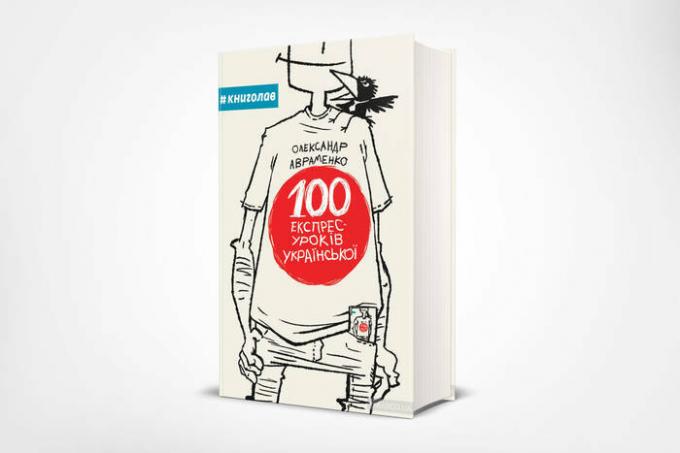
"100 express-lessons of the Ukrainian". Alexander Avramenko / open sources
This pocket-sized tutorial is based on the Ukrainian language video lessons that have been aired on the 1 + 1 channel for several years. The lessons became so popular with viewers that it was decided to publish them in paper form. The author of the lessons, a well-known philologist Alexander Avramenko, tried in one edition to cover all the inaccuracies and "Russisms" that are often found in Ukrainian speech. From the book you will learn not only the difference between "litka" and "homilka" or "rozstrochka" and "viplata". Here you will find simple rules for constructing phrases and be surprised by the vivid and accurate analogs of popular Russian proverbs. For example, few people know that the proverb “fish without fish and cancer” is translated into Ukrainian as “at the stepu and khrushch - meat”.
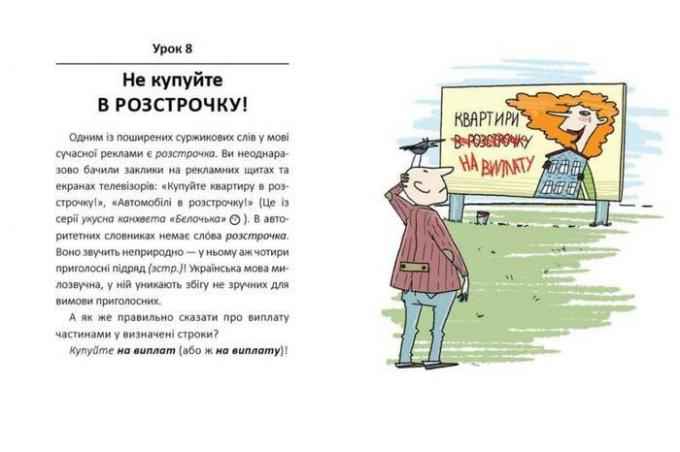
Alexander Avramenko's book is easy and accessible / open sources
For those who do not like the academic style, this book will delight with its easy presentation of material and original design. All sections are written concisely, concisely and with a great sense of humor, and each example is accompanied by funny illustration. In general, the book leaves behind the impression of an entertaining reading, however, the information that you read will be surprisingly deposited "in the subcortex".
"Ukrainian easy!" Natalia Klimenko, Pavel Melnik-Krisachenko
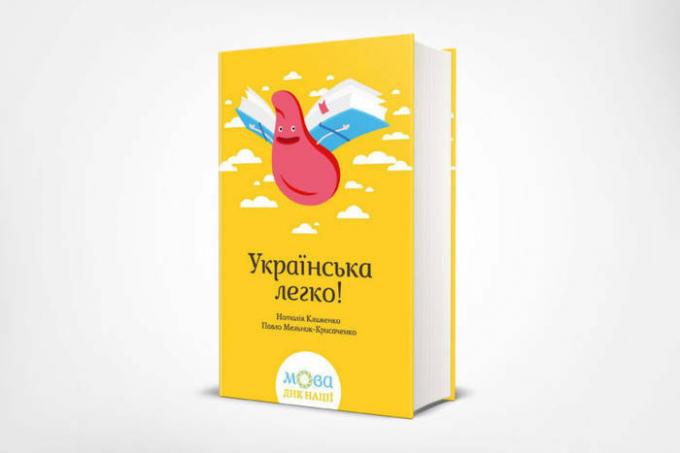
"Ukrainian easy!" Natalia Klimenko / open sources
An incredibly easy to read and understand book, in which the basic rules for constructing Ukrainian speech are set out in comic format. The protagonist of the book, Lepetun or Yazychok, points out the common mistakes that our everyday “mova” is full of: tracing paper from the Russian language, surzhik and incorrect phraseological turns. After reading the book, many people will have a "template break", sorry for the slang. For example, the stress in the word Aries (on the second syllable), the absence of the word "spіvpadati" in the Ukrainian language and the difference between the words "ribalka" and "ribolovlya" will become a discovery.
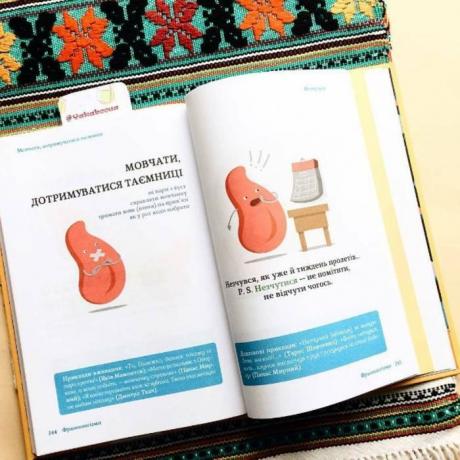
Learning Ukrainian from comics is fun and unusual / open sources
The book is very conveniently divided into sections. Among them there are "Antisurzhik", "Pravopis", "Parony y omonіmi", "Sinonіmi", "Phraseologizmi", "Nagolos". The reader will be delighted not only by the simplicity and accessibility of information, but also by funny pictures. And for those who fall in love with Lepetun and want to continue this acquaintance, there is a direct road to the site "Mova - DNA of the nation", where you can find even more interesting and useful things about the Ukrainian language.
"Antisurzhik. Listen to yourself and speak correctly. " Alexandra Serbenskaya
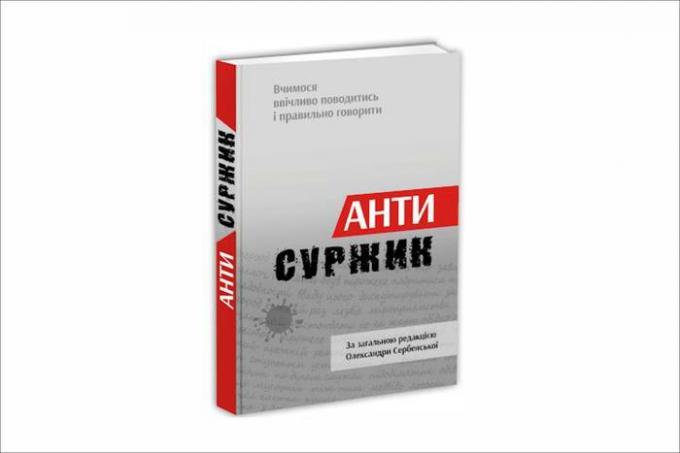
"Antisurzhik". Alexandra Serbenskaya / open sources
If you have already mastered comics and express Ukrainian lessons, but at the same time do not force yourself to take in the hands of a serious textbook, pay attention to the book "Anti-Surzhik" edited by Alexandra Serbian. In it you will find a lot of useful information on the use of words and phrases in Ukrainian speech. Errors and examples are structured in a very atypical way: not according to their lexical meaning, but according to the scope of their most frequent use. For example, in the section “Correctly Wrong” there are subsections “Osvita”, “In common documents”, “On the street”, “On the market”, “Spilkuvannya z children”.
A separate bonus of the book is a whole chapter devoted not only to speech etiquette, but also rules of conduct in society. The author analyzes the features and nuances of human communication from ancient times to the present day. True, in some ways these principles may seem outdated to the modern reader, but it will not hurt to know them if you claim to be a cultured person.
The third part of the book is occupied by an extensive section devoted to tracing from Russian, incorrect translation and surzhik. There is also a stress dictionary and almost 70 pages of phraseological units. At the end, the author invites the reader to go through test tasks that will help check how memorable the material is.
"Lessons from the sovereign movi". Boris Rogoza
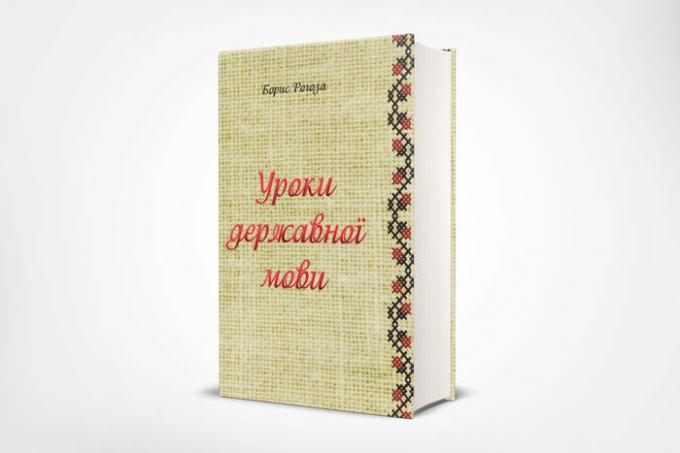
"Lessons from the sovereign movi". Boris Rogoza / open sources
This book may well scare away potential "linguists" with its imposing appearance and serious title. But do not rush to set it aside and flip through a couple of pages. "The lessons of sovereign movi" were taught not by a boring academician, but by a well-known publicist and journalist Boris Rogoza. For many years in a row, he led a column in the Khreschatyk newspaper dedicated to the vocabulary and spelling of the Ukrainian language. In his column, the author answered readers' questions and tried to present useful information in simple words. For the most part, these texts are used to compose the book.
It should be noted right away that you will not find comics and pictures here. But this is compensated by the mass of really frequent speech errors. From the book, you can learn the difference between "vidmina" and "skasuvannyam", "vidnoshennyam" and "put", "result" and "inheritance". You will figure out how to call a person "with a twist" (spoiler: "with a zest") and learn a lot of new things in the use of prepositions and cases. The only difficulty is in the presentation of the material. The information in the book is divided into lessons, and in one lesson both the lexical meaning of words and declension by cases can be mixed. However, in the beginning there is very detailed content, with the help of which you can find what will be of interest to you.
“The culture of the word. Movnostilistic pleasures ". Alexander Ponomariv
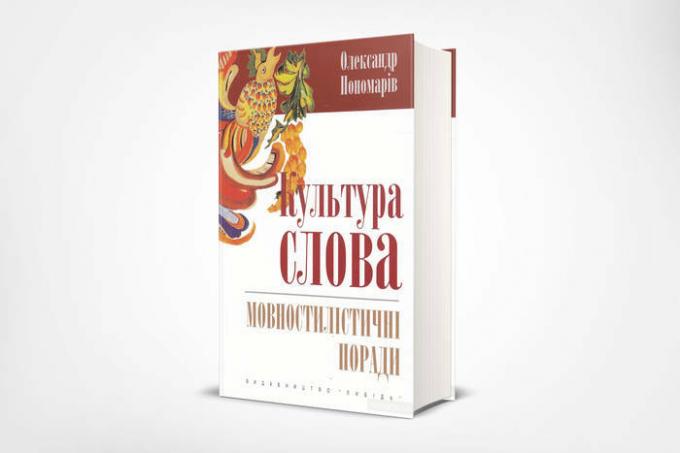
“The culture of the word. Movnostilistic pleasures ". Alexander Ponomariv / open sources
Another book "heavyweight", which, nevertheless, will help you significantly improve your basic knowledge of the Ukrainian language. The book contains articles and columns of the famous Ukrainian linguist, Doctor of Philology Alexander Ponomariv. The author explores different styles of Ukrainian speech, from everyday speech to official bureaucratic. For each of these styles, he has a lot of recommendations for choosing the "right" and "wrong" words, phrases and fixed expressions.
The thoughtful reader will find an interesting insight into the rules for placing stress in words, the morphological "jungle" of the construction of a word and the subtleties of its lexical meaning. You can also learn (and then boast of erudition) about many of the primordially Ukrainian analogues of borrowed words. If you won’t surprise anyone with “fly” or “svitlina”, then the word “first” in the meaning of “element” or “shapkuvati” in the meaning of “welcome” will be a surprise for your interlocutors.
You will also be interested to read:
I read it myself: TOP-7 funny books for children and about children
What to read on maternity leave: TOP-5 frank and funny books about motherhood




